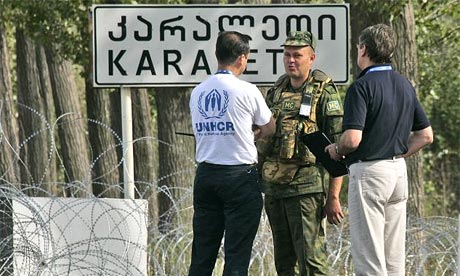

A Russian soldier, centre, stops a UN humanitarian convoy at the checkpoint at Karaleti, Georgia, before the convoy was turned away. Photograph: AP/Efrem Lukatsky
The French president, Nicolas Sarkozy, arrived in Moscow today as part of a European Union delegation hoping to persuade Russia to honour its pledge to withdraw troops from Georgia.
As Sarkozy arrived in the capital, a Russian foreign ministry spokesman set a tough tone for the talks, saying that Moscow opposed an independent EU monitoring mission in Georgia.
Andrei Nesterenko said the deployment of an EU monitoring force would lead to unnecessary "fragmentation" of international monitoring efforts by the UN and the Organisation for Security and Cooperation in Europe.
Sarkozy's primary mission will be to persuade the Russian president, Dmitry Medvedev, to pull his forces out of Georgia.
The EU delegation, which includes the European Commission president, José Manuel Barroso, and the EU foreign policy chief, Javier Solana, will also push for a quick deployment of several hundred EU monitors to Georgia.
However, there was little sign that Russia intends to comply with the EU's demands. Nearly a month after a truce negotiated by Sarkozy ended a five-day war, Russian troops remain entrenched deep inside Georgian territory.
Earlier today, Russian soldiers turned back a UN convoy from a tense zone around the breakaway province of South Ossetia in a blunt demonstration of who is in charge.
The convoy of four vehicles from UN agencies waited for about an hour at the checkpoint in Karaleti, but was turned away after a brief discussion with a Russian general.
David Carden, who is leading the interagency mission by the World Food Programme, Unicef and the UN refugee agency, said the teams were attempting to do a preliminary humanitarian assessment and would try again.
After talks in Moscow, Sarkozy and the EU delegation will travel to the Georgian capital, Tbilisi, to meet the president, Mikheil Saakashvili.
Sarkozy has been criticised for giving the Russians too much room for interpretation in the peace deal, which was signed on August 12. His diplomatic blitz to Moscow and Tbilisi is seen by some as a last chance to save it - as well as his own credibility as a peacemaker.
Georgia and the west have accused Russia of failing to honour its pledge to withdraw troops to positions held before the fighting broke out. Russia says those troops are peacekeepers and are therefore allowed under the accord to help maintain security around Georgia's breakaway provinces, South Ossetia and Abkhazia. Moscow has recognised the two regions as independent states.
Meanwhile, Georgia has opened a new legal front in its battle with Russia for control of the regions, going to the International Court of Justice in The Hague over claims of Russian human rights abuses in the two provinces. It wants the court to impose emergency measures to halt killings and forced expulsions.
Tina Burjaliani, Georgia's first deputy minister of justice, told the court today that Russian forces, local militias and mercenaries were conducting a campaign of murder, forced displacement and attacks on towns and villages that started in the early 1990s and culminated in last month's brief war.
The court is the UN's highest judicial body. Its rulings are binding, but it has no enforcement powers.
No comments:
Post a Comment